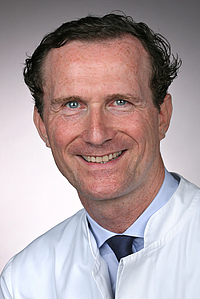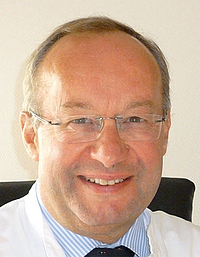Projects
The scientific research is structurally divided into two project areas:
Project area A: Strengthening GvL effects
Project area B: Prevention and treatment of GvHD.
This division has proven to be successful & constructive and will therefore be continued. i
Collaborative activities between the project areas have transformed the TRR 221 into a tight network in which it is clearly recognized that each GvL-modulating strategy must take into account its influence on GvHD (and vice versa).
What is Project A Area
Whats is Project B
Taken together, the B-projects tackle the GvHD problem from different angles with the aim to jointly develop innovative complementary or synergistic strategies. The coordinated time- and event-driven biopsy program on gut GvHD in Regensburg provides several B-projects with clinical samples and data of patients for research analyses. All PIs have proven unrestricted willingness to share their expertise, models, technologies and reagents with all other investigators. Promising strategies in GvL projects have been evaluated with respect to their influence on GvHD by the cooperating partners (and vice versa) and all participating institutions supported translational studies evolving from the TRR 221 projects (e.g. B01, B07, B10, B13, MAGIC trial).
Whats is Service Project
Project IRTG
The Integrated Research Training Group (IRTG) of the CRC/TR 221 supports the participating MDs and PhD students of the program by providing well-structured and interdisciplinary training and qualification modules. The program focusses on basic and translational science in the area of allogeneic hematopoietic stem cell transplantation and cell therapy, but covers all topics and technologies of current biomedical research. Through close supervision and mentoring programs the students are well supported for a successful graduation in an innovative research field.
Prof. Dr. Matthias Edinger
University Hospital Regensburg
Department of Internal Medicine III
Franz-Josef-Strauß-Allee 11
93053 Regensburg
T: +49 941 944-5580
matthias.edinger(at)ukr.de
PD Dr. Anita Kremer
University Hospital Erlangen
Department of Medicine 5
Ulmenweg 18
91054 Erlangen
T: +49 9131 85-43183
anita.kremer(at)uk-erlangen.de
PD Dr. Friederike Berberich-Siebelt
University Würzburg
Institute for Pathology
Josef-Schneider-Str. 2
97080 Würzburg
T: +49 931 3181208
path230@mail.uni-wuerzburg.de
Project IRTG
The Integrated Research Training Group (IRTG) of the CRC/TR 221 supports the participating MDs and PhD students of the program by providing well-structured and interdisciplinary training and qualification modules. The program focusses on basic and translational science in the area of allogeneic hematopoietic stem cell transplantation and cell therapy, but covers all topics and technologies of current biomedical research. Through close supervision and mentoring programs the students are well supported for a successful graduation in an innovative research field.
- Prof. Dr. Matthias Edinger
University Hospital Regensburg
Department of Internal Medicine III
Franz-Josef-Strauß-Allee 11
93053 Regensburg
T: +49 941 944-5580
matthias.edinger(at)ukr.de
- PD Dr. Anita Kremer
University Hospital Erlangen
Department of Medicine 5
Ulmenweg 18
91054 Erlangen
T: +49 9131 85-43183
anita.kremer(at)uk-erlangen.de
- PD Dr. Friederike Berberich-Siebelt
University Würzburg
Institute for Pathology
Josef-Schneider-Str. 2
97080 Würzburg
T: +49 931 3181208
path230@mail.uni-wuerzburg.de
Project INF
The INF project represents the data infrastructure project. It focuses mainly on data management and sustained storage of all publication relevant scientific data. We also support the individual projects with adequate software and expert knowledge during the entire data analysis process. Our long-term aim is that the increasing amount of research data generated by the numerous immunologists, physicians and other scientists at the TR 221 sites Regensburg, Erlangen and Würzburg ultimately help to find new ways and tools that make allogeneic hematopoietic stem cell transplantation a more safe and effective treatment procedure, particularly by reducing transplant complications and relapse rates in patients. The INF project is financed during the first funding period by funds from the free state of Bavaria.
- Liang M, Dickel N, Györfi A, SafakTümerdem B, Li Y, Rigau AR, Liang C, Hong X, Shen L, Matei A, Trinh-Minh T, Tran-Manh C, Zhou X, Zehender A, Kreuter A, Zou H, Schett G, Kunz M, Distler JHW. Attenuation of fibroblast activation and fibrosis by adropin in systemic sclerosis. Sci Transl Med 2024;16(740):eadd6570. doi: 10.1126/scitranslmed.add6570.
- Karl F, Liang C, Böttcher-Loschinski R, Stoll A, Flamann C, Richter S, Lischer C, Völkl S, Jacobs B, Böttcher M, Jitschin R, Bruns H, Fischer T, Holler E, Rösler W, Dandekar T, Mackensen A, Mougiakakos D. Oxidative DNA damage in reconstituting T cells is associated with relapse and inferior survival after allo-SCT. Blood 2023;141(13):1626-39. doi: 10.1182/blood.2022017267.
- Lainscsek X, Taher L. Predicting chromosomal compartments directly from the nucleotide sequence with DNA-DDA. Brief Bioinform 2023;24(4):bbad198.doi: 10.1093/bib/bbad198.
- Mirus T, Lohmayer R, Döhring C, Halldórsson BV, Kehr B. GGTyper: genotyping complex structural variants using short-read sequencing data. Bioinformatics 2024;40(Suppl_2):ii11-ii19. doi: 10.1093/bioinformatics/btae391.
- Cao K, Elfaramawy N, Weidlich M, Kehr B. From Program Chains to Exploratory Workflows: PopinSnake for Genomic Insertion Detection. 2023 IEEE 19th International Conference on e-Science (e-Science) 2023. doi: 10.1109/e-science58273.2023.10254924.
- Ascheid D, Baumann M, Pinnecker J, Friedrich M, Szi-Marton D, Medved C, Bundalo M, Ortmann V, Öztürk A, Nandigama R, Hemmen K, Ergün S, Zernecke A, Hirth M, Heinze KG, Henke E. A vascularized breast cancer spheroid platform for the ranked evaluation of tumor microenvironment-targeted drugs by light sheet fluorescence microscopy. Nat Commun 2024;15(1):3599. doi: 10.1038/s41467-024-48010-z.
- Peulen T, Hemmen K, Greife A, Webb BM, Felekyan S, Sali A, Seidel CAM, Sanabria H, Heinze KG. tttrlib: modular software for integrating fluorescence spectroscopy, imaging, and molecular modeling. Bioinformatics 2025;41(2):btaf025. doi: 10.1093/bioinformatics/btaf025.
- Breitenbach T, Englert N, Osmanoglu Ö, Rukoyatkina N, Wangorsch G, Heinze K, Friebe A, Butt E, Feil R, Dittrich M, Gambaryan S, Dandekar T. A modular systems biological modelling framework studies cyclic nucleotide signaling in platelets. Jl Theor Biol 2022;550:111222. doi: 10.1016/j.jtbi.2022.111222.
- Thiele Orberg E*, Meedt E*, Hiergeist A*, Xue J, Heinrich P, Ru J, Ghimire S, Miltiadous O, Lindner S, Tiefgraber M, Göldel S, Eismann T, Schwarz A, Göttert S, Jarosch S, Steiger K, Schulz C, Gigl M, Fischer JC, Janssen K, Quante M, Heidegger S, Herhaus P, Verbeek M, Ruland J, van den Brink MRM, Weber D, Edinger M, Wolff D, Busch DH, Kleigrewe K, Herr W, Bassermann F, Gessner A, Deng L, Holler E, Poeck H. Bacteria and bacteriophage consortia are associated with protective intestinal metabolites in patients receiving stem cell transplantation. Nat Cancer 2024;5(1):187-208. doi: 10.1038/s43018-023-00669-x.
- Meedt E, Hiergeist A, Gessner A, Dettmer K, Liebisch G, Ghimire S, Poeck H, Edinger M, Wolff D, Herr W, Holler E, Weber D. Prolonged Suppression of Butyrate-Producing Bacteria Is Associated With Acute Gastrointestinal Graft-vs-Host Disease and Transplantation-Related Mortality After Allogeneic Stem Cell Transplantation. Clin Infect Dis 2021;74(4):614-21. doi: 10.1093/cid/ciab500.
- Prof. Dr. med. Thomas Dandekar
Julius-Maximilians-Universität Würzburg
Lehrstuhl für Bioinformatik
Am Hubland
97074 Würzburg
T: +49 931 318 4550
dandekar(at)biozentrum.uni-wuerzburg.de
- Prof. Dr. med. Ernst Holler
University Hospital Regensburg
Department of Internal Medicine III
Franz-Josef-Strauss-Allee 11
93053 Regensburg
T: +49 941 943 5935
ernst.holler(at)ukr.de
- Prof. Dr. rer. nat. Birte Kehr
LIT – Leibniz Institute for Immunotherapy (former RCI)
c/o Universitätsklinikum Regensburg
Franz-Josef-Strauß-Allee 11
93053 Regensburg
T: +49 941 944 18161
birte.kehr(at)ukr.de
- Dr. rer. nat. Meik Kunz
FAU Erlangen-Nürnberg
Wetterkreuz 15
91058 Erlangen
T: +49 9131 8567784
meik.kunz(at)fau.de
Project Z01
GvHD diagnosis is still a challenge even for experienced transplant pathologists due to its variable clinical and histological manifestation and the still insufficient validity and reproducibility of diagnostic histopathological criteria. In this service project, expert (immuno-)histological evaluation of human and murine tissues is provided. Furthermore, a digital histology archive will be established that includes consensus reports generated in virtual microscopy conferences and that are linked to clinical data bases for the evaluation of transplant outcome, complications and prognostic histology biomarkers.
- Hippe K, Kreft A, Reu-Hofer S, Rosenwald A, Ferrazzi F, Daniel C, Amann K, Kraus S, Holler E, Kandulski A, Hirsch D, Buttner A, Rosler W, Hildner K, Winkler J, Büttner-Herold M. Round-Robin test for the histological diagnosis of acute colonic Graft-versus-Host disease validating established histological criteria and grading systems. Virchows Arch 2023;483(1):47-58. doi: 10.1007/s00428-023-03544-3.
- Shaikh H, Pezoldt J, Mokhtari Z, Gamboa Vargas J, Le DD, Pena Mosca J, Arellano Viera E, Kern MA, Graf C, Beyersdorf N, Lutz MB, Riedel A, Büttner-Herold M, Zernecke A, Einsele H, Saliba AE, Ludewig B, Huehn J, Beilhack A. Fibroblastic reticular cells mitigate acute GvHD via MHCII-dependent maintenance of regulatory T cells. JCI Insight 2022;7(22):e154250. doi: 10.1172/jci.insight.154250.
- Biedermann A, Patra-Kneuer M, Mougiakakos D, Büttner-Herold M, Mangelberger-Eberl D, Berges J, Kellner C, Altmeyer S, Bittenbring JT, Augsberger C, Ilieva-Babinsky K, Haskamp S, Beier F, Lischer C, Vera J, Lührmann A, Bertz S, Völkl S, Jacobs B, Steidl S, Mackensen A, Bruns H. Blockade of the CD47/SIRPalpha checkpoint axis potentiates the macrophage-mediated anti-tumor efficacy of tafasitamab. Haematologica 2024; 109(12):3928-40. doi: 10.3324/haematol.2023.284795.
- Schreiber L, Ghimire S, Hiergeist A, Renner K, Althammer M, Babl N, Peuker A, Schoenhammer G, Hippe K, Gessner A, Albrecht C, Pielmeier F, Büttner-Herold M, Bruns H, Hoffmann P, Herr W, Holler E, Peter K, Kreutz M, Matos C. Strain specific differences in vitamin D3 response: impact on gut homeostasis. Front Immunol 2024;15:1347835. doi: 10.3389/fimmu.2024.1347835.
- Matthe DM, Dinkel M, Schmid B, Vogler T, Neurath MF, Poeck H, Neufert C, Büttner-Herold M, Hildner K. Novel T cell/organoid culture system allows ex vivo modeling of intestinal graft-versus-host disease. Front Immunol 2023;14:1253514. doi: 10.3389/fimmu.2023.1253514.
- Hirsch D, Wangsa D, Zhu YJ, Hu Y, Edelman DC, Meltzer P S, Heselmeyer-Haddad K, Ott C, Kienle P, Galata C, Horisberger K, Ried T, Gaiser T. Dynamics of Genome Alterations in Crohn’s Disease-Associated Colorectal Carcinogenesis. Clin Cancer Res 2018;24(20):4997–5011. doi: 10.1158/1078-0432.CCR-18-0630.
- Hirsch D, Hardt J, Sauer C, Heselmeyer-Hadded K, Witt SH, Kienle P, Ried T, Gaiser T. Molecular characterization of ulcerative colitis-associated colorectal carcinomas. Mod Pathol 2021;34(6);1153-66. doi: 10.1038/s41379-020-00722-5.
- Takáts Z, Wiseman JM, Gologan B, Cooks RG. Mass spectrometry sampling under ambient conditions with desorption electrospray ionization. Science 2004;306(5695):471-3. doi: 10.1126/science.1104404.
- Jones EA, Simon D, Karancsi T, Balog J, Pringle SD, Takats Z. Matrix Assisted Rapid Evaporative Ionization Mass Spectrometry. Anal Chem 2019;6;91(15):9784-91. doi: 10.1021/acs.analchem.9b01441.
- Strittmatter N, Lovrics A, Sessler J, McKenzie JS, Bodai Z, Doria ML, Kucsma N, Szakacs G, Takats Z. Shotgun Lipidomic Profiling of the NCI60 Cell Line Panel Using Rapid Evaporative Ionization Mass Spectrometry. Anal Chem 2016, 2;88(15):7507-14. doi: 10.1021/acs.analchem.6b00187.
- Prof. Dr. Matthias Evert
University Regensburg
Department of Pathology
Franz-Josef-Strauß-Allee 11
93053 Regensburg
T: +49 941 944-6600
matthias.evert(at)ukr.de
- Prof. Dr. med. Maike Büttner-Herold
University Hospital Erlangen
Department of Nephropathology
Krankenhausstraße 8-10
91054 Erlangen
T: +49 9131 85-22605
maike.buettner(at)uk-erlangen.de
- Prof. Dr. med. Andreas Rosenwald
Julius-Maximilians-University Würzburg
Department of Pathology
Josef-Schneider-Str. 2
97080 Würzburg
T: +49 931 31-81199
rosenwald(at)uni-wuerzburg.de
Project Z02
Due to the complexity of graft-versus-host (GvH) and graft-versus-leukemia (GvL) reactions their basic biology as well as novel intervention strategies can only be examined in adequate preclinical in vivo models. In addition to providing general support in all experimental and regulatory issues, the Z02 service project will generate valuable new genetically modified mouse strains for the consortium and provide an experimental platform permitting the investigation of GvHD in germ-free and gnotobiotic mice. We aim for highly informative, cross-validated, reproducible and predictive in vivo models at the three participating centers.
- Dittmar DJ*, Pielmeier F*, Strieder N, Fischer A, Herbst M, Stanewsky H, Wenzl N, Röseler E, Eder R, Gebhard C, Schwarzfischer-Pfeilschifter L, Albrecht C, Herr W, Edinger M*, Hoffmann P*, Rehli M*. Donor regulatory T cells rapidly adapt to recipient tissues to control murine acute graft-versus-host disease. Nat Commun 2024;15(1):3224. doi: 10.1038/s41467-024-47575-z.
- Seefried M, Hundhausen N, Kroeger I, Büttner-Herold M, Hoffmann P, Edinger M, Ullrich E, Berberich-Siebelt F, Britt WJ, Mach M, Winkler TH. Murine cytomegalovirus reactivation concomitant with acute graft-versus-host disease is controlled by antibodies. JCI Insight 2023;8(5):e149648. doi: 10.1172/jci.insight.149648.
- Gamboa Vargas J*, Wagner J*, Shaikh H, Lang I, Medler J, Anany M, Steinfatt T, Peña Mosca J, Haack S, Dahlhoff J, Büttner-Herold M, Graf C, Viera EA, Einsele H, Wajant H*, Beilhack A*. A TNFR2-specific TNF fusion protein with improved in vivo activity. Front Immunol 2022; 13:888274. doi: 10.3389/fimmu. 2023.1352525.
- Anany MA, Haack S, Lang I, Dahlhoff J, Gamboa Vargas J, Steinfatt T, Päckert L, Weisenberger D, Zaitseva O, Medler J, Kucka K, Zhang T, Van Belle T, van Rompaey L, Beilhack A*, Wajant H*. Generic design principles for antibody based tumour necrosis factor (TNF) receptor 2 (TNFR2) agonists with FcγR-independent agonism. Theranostics 2024; 14(2):496-509. doi: 10.7150/thno.84404.
- Shaikh H, Pezoldt J, Mokhtari Z, Gamboa Vargas J, Le DD, Peña Mosca J, Arellano Viera E, Kern MAG, Graf C, Beyersdorf N, Lutz MB, Riedel A, Büttner-Herold M, Zernecke A, Einsele H, Saliba AE, Ludewig B, Huehn J, Beilhack A. Fibroblastic reticular cells mitigate acute GvHD via MHCII-dependent maintenance of regulatory T cells. JCI Insight 2022; 7(22):e154250. doi: 10.1172/jci.insight.154250.
- Riegel C, Boeld TJ, Doser K, Huber E, Hoffmann P, Edinger M. Efficient treatment of murine acute GvHD by in vitro expanded donor regulatory T cells. Leukemia 2020;4(3):895-908. doi: 10.1038/s41375-019-0625-3.
- Ewendt F, Drewitz F, Althammer M, Eichler C, Brandsch C, Brey S, Winkler TH, Wilkens MR, S-Arnaud R, Kreutz M, Stangl GI. Vitamin D stimulates Il-15 synthesis in rodent muscle. Biochem Biophys Rep 2025; 41:101925.DOI: 10.1016/j.bbrep.2025.101925.
- Mueller JPJ, Dobosz M, O’Brien N, Abdoush N, Giusti AM, Lechmann M, Osl F, Wolf AK, Arellano-Viera E, Shaikh H, Sauer M, Rosenwald A, Herting F, Umana P, Colombetti S, Pöschinger T, Beilhack A. ROCKETS – a novel one-for-all toolbox for light sheet microscopy in drug discovery. Front Immunol 2023; 14:1034032. doi: 10.3389/fimmu.2023.1034032.
- PD Dr. rer. nat. Petra Hoffmann
University Hospital Regensburg
Department of Internal Medicine III
LIT – Leibniz Institute for Immunotherapy (former RCI)
Franz-Josef-Strauß-Allee 11
93053 Regensburg
T: +49 941 944-5592
petra.hoffmann(at)ukr.de
- Prof. Dr. rer. nat. Thomas Winkler
FAU Erlangen-Nürnberg
Department of Biology
Nikolaus-Fiebiger-Center for Molecular Medicine
Glückstraße 6
91054 Erlangen
T: +49 9131 85-29136
thomas.winkler(at)fau.de
- Prof. Dr. med. Dr. med. univ. Andreas Beilhack
University Hospital Würzburg
Department of Medicine II
ZEMM Center for Experimental Molecular Medicine
Zinklesweg 10
97078 Würzburg
T: +49 931 201-44040
beilhack_a(at)ukw.de








